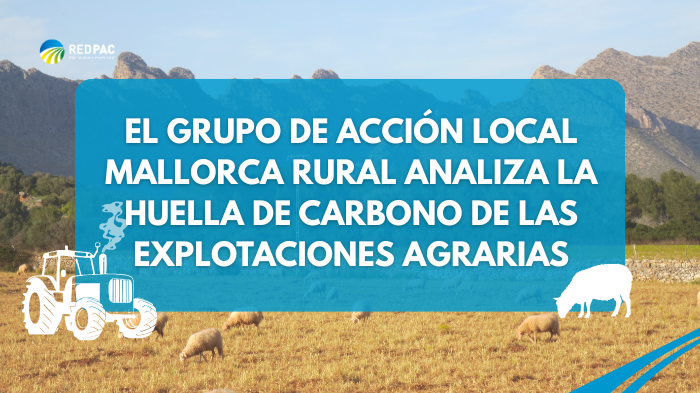
25 de November de 2025
Dinamización rural
Cambio climático y gestión de recursos naturales
Biodiversidad y paisaje
The Local Action Group has presented the diagnosis of the carbon footprint of agricultural holdings in Mallorca, prepared through LEADER and financed by EAFRD
- The Local Action Group has presented the diagnosis of the carbon footprint of agricultural holdings in Mallorca, prepared through LEADER and financed by EAFRD
- The study highlights the sector's low emissions and its role in the island's decarbonization.
Understanding the origin and distribution of greenhouse gas emissions is crucial for the ecological transition and adaptation to climate change. In the Balearic Islands, the agricultural sector accounts for 2.8% of carbon dioxide ( CO2 ) emissions.
To characterize the carbon footprint of the agricultural sector in the territory, the Local Action Group (LAG) Mallorca Rural , through the LEADER approach, has promoted the “Diagnosis of the Carbon Footprint of Agricultural Holdings in Mallorca ” throughout 2025.
Project objectives
To understand the environmental situation of the agricultural sector and its future prospects within the framework of a transition towards a more resilient and sustainable system, they established the following objectives.
Characterize the emissions profile of the agricultural sector in Mallorca.
Measure the carbon footprint at the farm level.
Compare results between different production systems .
Propose measures to mitigate emissions.
Contribute to decarbonization commitments.
Development
The measurements were taken on 30 farms, selected from 86 registered farms, taking into account their diversity and representativeness. Different sectors, both conventionally and organically managed, and different geographical areas were considered, especially the Raiguer and Es Pla regions (80% of the total).
At each farm, technical visits and interviews were conducted to gather data on energy consumption, fertilizer and pesticide use, livestock density, and cultivated areas, among other factors. Based on this data, emissions were calculated and specific opportunities for improvement were identified.
Results
The assessment estimates that the agricultural sector in the Balearic Islands generates a total carbon footprint of 2,250 tons of CO2 . The main source of emissions is agricultural machinery (26.1%), followed by the use of refrigerants, livestock farming, and plant protection products.
Farms that are more dependent on inputs (horticulture and viticulture) have shown a larger carbon footprint, while those adapted to the environment, such as nuts, olive groves, or dryland fruit orchards, have lower levels. Furthermore, organic farming generates up to 40% fewer emissions than conventional farming.
Magdalena Llul, manager of the Local Action Group (LAG), emphasizes that these emissions could be reduced by up to 16% and that the agricultural sector contributes “little to emissions and a great deal to protecting the land.” Farms “have potential as carbon sinks to generate income through emissions offsetting models in which emitting sectors finance agri-environmental actions.”
Proposals
Among the most outstanding good practices and emissions reduction measures are the following.
Reduction in fossil fuel consumption derived from the use of agricultural machinery and vehicles.
Promotion of renewable energies , especially with the installation of photovoltaic panels.
Implementation of regenerative agriculture , which is generating increasing interest, as well as practices applicable to eco-regimes of plant cover, rotations and composting.
Optimization of nitrogen fertilization and the replacement of synthetic fertilizers.
Valorization of agricultural and livestock by-products : use and transformation of plant and livestock remains.
Magdalena Llul indicates that, although they do not yet have a concrete plan, their intention is that in the following periods this line of action will continue, for example, through aid to implement these measures.
Participants and funding
This has been a project of the GAL Mallorca Rural, within its Participatory Local Development Strategy 2014-2022, using the LEADER methodology.
This initiative is also co-financed 80% by EAFRD funds , 14% by the Ministry of Agriculture, Fisheries and Food and 6% by the Ministry of Agriculture, Fisheries and Natural Environment of the Government of the Balearic Islands .









